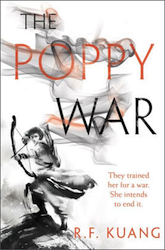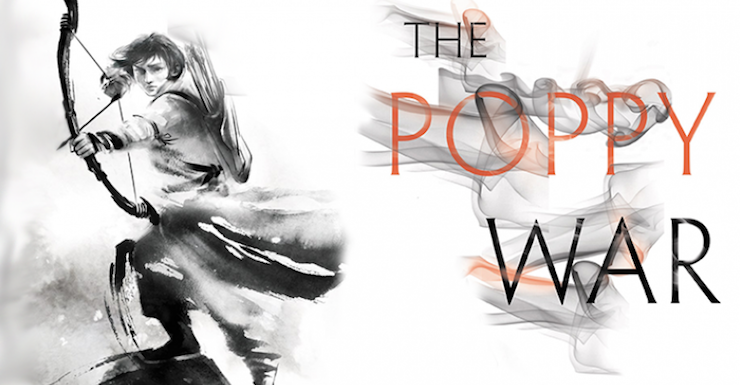R.F. Kuang is apparently one of those prodigious youthful achievers who make the rest of us feel like slackers. Still in her early twenties, with a prestigious graduate scholarship to her name, she has a highly-anticipated debut novel in The Poppy War. Published by Harper Voyager, it’s the first novel in a projected three set in a fantasy world inspired by the history of China’s 19th and early 20th century. It takes its fantasy epic-ness seriously: this is a novel that sprawls out from its relatively contained beginning to a broad canvas of war and magic and divinity.
Buy the Book


The Poppy War
War orphan Rin sees the Keju—the Nikara Empire’s empire-wide test to find the most talented young people to study at their national academies—as her only possible escape from an arranged marriage and a life of servitude and despair. When she aces the test, it comes as a shock to everyone, including local officials who accuse her of cheating. But success here is only her first hurdle: accepted to Sinegard, the most elite military school in Nikan, she finds that being a dark-skinned peasant orphan from the rural south in a milieu filled with the scions of the Warlords and the wealthy and privileged counts strongly against her. But she discovers there a talent for the legendary art of shamanism, with the aid of an apparently insane (and much-disdained) teacher: a teacher who is trying to show her how not to use the power she has, when Rin desperately wants that power for herself. To prove herself. To show everyone just how good she is.
War with the Federation of Mugen is on the horizon for much of the first part of the novel, which follows the near-standard conventions of a fantasy boarding school story, with the added filip of it being a highly competitive military boarding school: an outsider navigates a complex and highly stratified new environment, making friends and rivals as she goes. This section of the novel is tight and compelling, but a little formulaic, and this initial school-story setup makes Kuang’s choice to break out into a grim and savage epic fantasy treatment when the threatened war with Mugen finally comes all the more interesting—if somewhat disconcerting.
Rin finds herself (and her shamanic powers) in the midst of war for her country’s very survival. Kuang’s depiction of the war between Nikan and Mugen is strongly influenced by the Japanese invasion of China in the 1930s, and specifically the Nanjing Massacre (also known as the Rape of Nanking). Assigned to a company of “Bizarre Children”—oddball misfits with shamanic powers or other special talents—Rin once again struggles to find her place and to live up to her commander’s expectations, as she discovers that she and her commander share a connection to a shared heritage and a powerful, dangerous divinity. But Rin is determined to succeed. She’s not just going to fight this war. She’s going to win it. No matter who she has to kill, or what it costs.
If The Poppy War had not opened with Rin as a young woman—and shortly thereafter as a student at a boarding school that seemed at least marginally supportive—or if it had been a little less careful about how it depicted its violence, its genocide, and its warfare, I would have no hesitation in referring to it as part of the grimdark tradition in epic fantasy. As it stands, The Poppy War is definitely in dialogue with this tradition, but standing slightly apart from it: it flirts with the nihilistic cynicism of the grimdark tradition without quite committing to it, and holds out hope for things to become either better or worse in the sequel.
Kuang’s characterisation is excellent when it comes to her main character, but this doesn’t come across as strongly with the secondary characters. In terms of pacing, The Poppy War builds slowly but builds momentum towards the conclusion—but the ramping up of tension and consequence feels a bit…
How to put it?
This is going to require a spoiler.
…
When your main character has committed genocide, it feels like a sequel will have a lot to live up to. Or live down to. It leaves one a little off-kilter, and I’m not quite sure how to judge The Poppy War without seeing how the ramifications of Kuang’s narrative choices play out in the sequel.
The Poppy War is a complex, sprawling, ambitious novel, part coming of age and part tragedy of power, that uses motifs and influences from the 20th century. It reminds me tonally of Lara Elena Donnelly’s Amberlough and Joe Abercrombie’s Half a King, in setting of K. Arsenault Rivera’s The Tiger’s Daughter, and structurally of P.C. Hodgell’s To Ride a Rathorn crossed with a war film. I feel ambivalent about whether or not it has succeeded in its ambitions, but Kuang is certainly a voice to watch.
And I look forward to seeing what she does next.
The Poppy War is available from Harper Voyager.
Read an excerpt here.
Liz Bourke is a cranky queer person who reads books. She holds a Ph.D in Classics from Trinity College, Dublin. Her first book, Sleeping With Monsters, a collection of reviews and criticism, was published in 2017 by Aqueduct Press and is nominated for a Hugo Award for Best Related Work. Find her at her blog, where she’s been known to talk about even more books thanks to her Patreon supporters. Or find her at her Twitter. She supports the work of the Irish Refugee Council and the Abortion Rights Campaign











This sounds like it’s in dialog not just with western epic fantasy but also contemporary Chinese xuanhuan novels, fantasies based on Taoist practice, wuxia elements, and traditional Chinese mythology. Or at any rate, I recognize from the description a lot of tropes — including the wild tone shift from academy to conflict — I’ve seen in xuanhuan webnovels. Setting those elements against a war based on the Japanese invasion is an interesting mix.